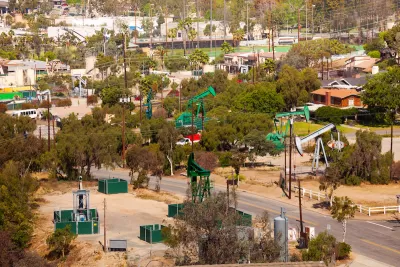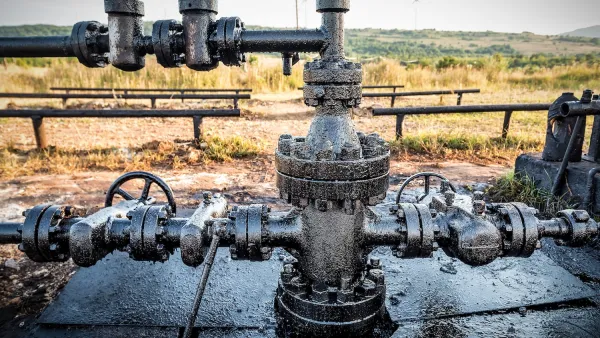Tens of thousands of idle oil wells litter the state. Taxpayers are often on the hook for cleanup.

A new report from the Sierra Club sheds light on the hazards that defunct oil wells in Los Angeles pose to public health and the environment. According to an LAist article by Erin Stone, “L.A. County has more idle (and active) wells than any other urban area in the state, putting the health of thousands of Angelenos — largely low-income communities of color — at risk from chemicals that may leak from idle wells.”
As Stone explains, “The report used data from CalGEM — the state agency that regulates oil drilling operations — to identify operators of tens of thousands of idle wells across the state and found it could cost $10 billion to clean up all the idle wells across California.” Three companies—Chevron, Aera Energy and California Resources Corporation—two-thirds of the state’s idle wells, the report notes.
While state and federal laws technically require oil operators to plan for plugging idle wells, many are left abandoned, placing the responsibility—and cost—for remediation on the state and taxpayers. “There’s been some progress in advancing more oversight of idle wells in recent years — state rules that went into effect in 2019 require oil operators to regularly monitor their idle wells for leaks.” The report recommends stricter policies, including putting a time limit of up to a year for leaving idle wells unplugged.
FULL STORY: Idle Oil Wells Are A Problem For Health And Climate. Who Should Pay For Cleaning Them Up?

Planetizen Federal Action Tracker
A weekly monitor of how Trump’s orders and actions are impacting planners and planning in America.

Map: Where Senate Republicans Want to Sell Your Public Lands
For public land advocates, the Senate Republicans’ proposal to sell millions of acres of public land in the West is “the biggest fight of their careers.”

Restaurant Patios Were a Pandemic Win — Why Were They so Hard to Keep?
Social distancing requirements and changes in travel patterns prompted cities to pilot new uses for street and sidewalk space. Then it got complicated.

Platform Pilsner: Vancouver Transit Agency Releases... a Beer?
TransLink will receive a portion of every sale of the four-pack.

Toronto Weighs Cheaper Transit, Parking Hikes for Major Events
Special event rates would take effect during large festivals, sports games and concerts to ‘discourage driving, manage congestion and free up space for transit.”

Berlin to Consider Car-Free Zone Larger Than Manhattan
The area bound by the 22-mile Ringbahn would still allow 12 uses of a private automobile per year per person, and several other exemptions.
Urban Design for Planners 1: Software Tools
This six-course series explores essential urban design concepts using open source software and equips planners with the tools they need to participate fully in the urban design process.
Planning for Universal Design
Learn the tools for implementing Universal Design in planning regulations.
Heyer Gruel & Associates PA
JM Goldson LLC
Custer County Colorado
City of Camden Redevelopment Agency
City of Astoria
Transportation Research & Education Center (TREC) at Portland State University
Camden Redevelopment Agency
City of Claremont
Municipality of Princeton (NJ)





























